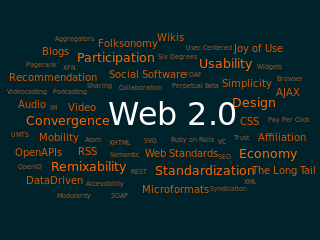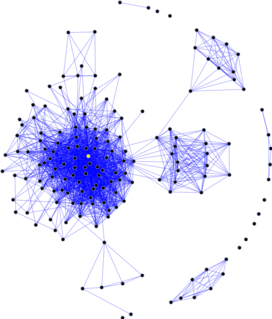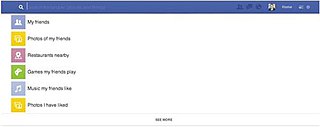Related Research Articles

Drupal is a free and open-source web content management system (CMS) written in PHP and distributed under the GNU General Public License. Drupal provides an open-source back-end framework for at least 14% of the top 10,000 websites worldwide – ranging from personal blogs to corporate, political, and government sites. Systems also use Drupal for knowledge management and for business collaboration.

Web 2.0 refers to websites that emphasize user-generated content, ease of use, participatory culture and interoperability for end users.
Facebook is an American online social media and social networking service owned by Meta Platforms. Founded in 2004 by Mark Zuckerberg with fellow Harvard College students and roommates Eduardo Saverin, Andrew McCollum, Dustin Moskovitz, and Chris Hughes, its name comes from the face book directories often given to American university students. Membership was initially limited to Harvard students, gradually expanding to other North American universities and, since 2006, anyone over 13 years old. As of 2020, Facebook claimed 2.8 billion monthly active users, and ranked fourth in global internet usage. It was the most downloaded mobile app of the 2010s.
The YouTube Application Programming Interface allows developers to access video statistics and YouTube channels data via two types of calls, REST and XML-RPC. Google describe YouTube's API resources as "APIs and Tools that let you bring the YouTube experience to your webpage, application or device."

Twitter is an American microblogging and social networking service on which users post and interact with messages known as "tweets". Registered users can post, like, and retweet tweets, but unregistered users can only read those that are publicly available. Users interact with Twitter through browser or mobile frontend software, or programmatically via its APIs. Prior to April 2020, services were accessible via SMS. The service is provided by Twitter, Inc., a corporation based in San Francisco, California, and has more than 25 offices around the world. Tweets were originally restricted to 140 characters, but the limit was doubled to 280 for non-CJK languages in November 2017. Audio and video tweets remain limited to 140 seconds for most accounts.

OpenSocial is a public specification that defines a component hosting environment (container) and a set of common application programming interfaces (APIs) for Web-based applications. Initially, it was designed for social network applications and developed by Google along with MySpace and a number of other social networks. More recently, it has become adopted as a general use runtime environment for allowing untrusted and partially trusted components from third parties to run in an existing web application. The OpenSocial Foundation moved to integrate or support numerous other Open Web technologies. This includes OAuth and OAuth 2.0, Activity Streams, and Portable Contacts, among others.

The social graph is a graph that represents social relations between entities. In short, it is a model or representation of a social network, where the word graph has been taken from graph theory. The social graph has been referred to as "the global mapping of everybody and how they're related".
The Facebook Platform is the set of services, tools, and products provided by the social networking service Facebook for third-party developers to create their own applications and services that access data in Facebook.
Google Friend Connect was a free social networking site from 2008 to 2012. Similar in practice to Facebook Platform and MySpaceID, it took a decentralised approach, allowing users to build a profile to share and update information via third-party sites. These sites acted as a host for profile sharing and social exchanges.
Social network advertising, also social media targeting, is a group of terms that are used to describe forms of online advertising/digital marketing that focus on social networking services. One of the major benefits of this type of advertising is that advertisers can take advantage of the users' demographic information and target their ads appropriately.
Social media marketing is the use of social media platforms and websites to promote a product or service. Although the terms e-marketing and digital marketing are still dominant in academia, social media marketing is becoming more popular for both practitioners and researchers. Most social media platforms have built-in data analytics tools, enabling companies to track the progress, success, and engagement of ad campaigns. Companies address a range of stakeholders through social media marketing, including current and potential customers, current and potential employees, journalists, bloggers, and the general public. On a strategic level, social media marketing includes the management of a marketing campaign, governance, setting the scope and the establishment of a firm's desired social media "culture" and "tone."

Facebook F8 is a mostly-annual conference held by Facebook, intended for developers and entrepreneurs who build products and services around the website. It was hosted in San Francisco, California until 2016, and moved to a more central Silicon Valley location in San Jose, California in 2017. Previous events started with a keynote speech by Facebook founder Mark Zuckerberg, followed by various breakout sessions concentrating on specific topics. Facebook has often introduced new features, and made new announcements, at the conference.

Instagram is an American photo and video sharing social networking service founded by Kevin Systrom and Mike Krieger. In April 2012, Facebook Inc. acquired the service for approximately US$1 billion in cash and stock. The app allows users to upload media that can be edited with filters and organized by hashtags and geographical tagging. Posts can be shared publicly or with pre-approved followers. Users can browse other users' content by tags and locations and view trending content. Users can like photos and follow other users to add their content to a personal feed.
Since the arrival of early social networking sites in the early 2000s, online social networking platforms have expanded exponentially, with the biggest names in social media in the mid-2010s being Facebook, Instagram, Twitter and Snapchat. The massive influx of personal information that has become available online and stored in the cloud has put user privacy at the forefront of discussion regarding the database's ability to safely store such personal information. The extent to which users and social media platform administrators can access user profiles has become a new topic of ethical consideration, and the legality, awareness, and boundaries of subsequent privacy violations are critical concerns in advance of the technological age.
140 Proof is an advertising company that uses social data from many sources to target relevant ads based on consumers' interests as indicated by their social activity across networks.

Facebook Graph Search was a semantic search engine that was introduced by Facebook in March 2013. It was designed to give answers to user natural language queries rather than a list of links. The name refers to the social graph nature of Facebook, which maps the relationships among users. The Graph Search feature combined the big data acquired from its over one billion users and external data into a search engine providing user-specific search results. In a presentation headed by Facebook CEO Mark Zuckerberg, it was announced that the Graph Search algorithm finds information from within a user's network of friends. Additional results were provided by Microsoft's Bing search engine. In July it was made available to all users using the U.S. English version of Facebook. After being made less publicly visible starting December 2014, the original Graph Search was almost entirely deprecated in June 2019.
Mixcloud is a popular British online music streaming service that allows for the listening and distribution of radio shows, DJ mixes and podcasts, which are crowdsourced by its registered users.

A progressive web application (PWA), commonly known as a progressive web app, is a type of application software delivered through the web, built using common web technologies including HTML, CSS, JavaScript, and WebAssembly. It is intended to work on any platform that uses a standards-compliant browser, including both desktop and mobile devices.

This article provides a detailed chronological account of the historical reception and criticism of security and privacy features in the WhatsApp messaging service.
References
- ↑ Carter, Brian (2012). The like economy: how businesses are making money with Facebook. Indianapolis, IN: Que. ISBN 978-0789749062.
- ↑ Smith, Chris Treadaway, Mari (10 April 2012). Facebook Marketing an Hour a Day (2nd ed.). Hoboken: John Wiley & Sons. ISBN 978-1118225868.
- ↑ https://developers.facebook.com/blog/post/2014/08/07/Graph-API-v2.1/ [ user-generated source ]
- ↑ "Does Facebook Fan-Gating Hurt Facebook Engagement?". Archived from the original on 2016-08-13. Retrieved 2016-08-11.
- ↑ Other problems with the abuse of Fan-gating,
- ↑ "Graph API v2.1 and updated iOS and Android SDKs - Facebook for Developers". Facebook Developers. Retrieved 2016-02-10.